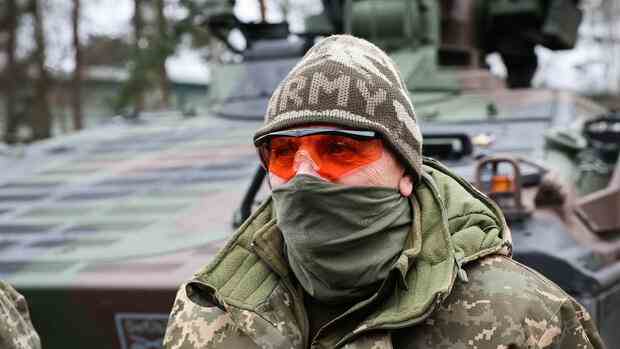A limiting factor in training is the lack of interpreters.
(Photo: dpa)
Berlin The Bundeswehr wants to have trained more than 3,000 Ukrainian soldiers by the end of 2023. This was announced by Federal Defense Minister Boris Pistorius (SPD) on Monday during a visit to the troops in Munster, Lower Saxony. Training on the Marder infantry fighting vehicle and the Leopard 2 battle tank, which Germany intends to hand over to the Ukraine by the end of March, is currently underway at the site. The schedule is set, said Pistorius.
“Training is a very special strength of our Bundeswehr,” emphasized the minister, who was accompanied by SPD leader Lars Klingbeil and CDU defense expert Henning Otte, among others. Also present were the Ukrainian Ambassador Oleksii Makeiev and the former Ukrainian world boxing champion Wladimir Klitschko. Pistorius said he was impressed by how quickly the Ukrainian soldiers became familiar with western weapon systems.
>> Read here: How Ukraine is increasingly desperate for weapons
Since the war began almost a year ago, around 1,200 Ukrainian soldiers have been trained in Germany. The Bundeswehr has expanded its training capacities and will continue to do so, the minister said. A “limiting factor” in the training is the lack of interpreters. Ambassador Makeiev stated that an attempt will be made to recruit translators from the Ukrainian community in Germany and Ukraine.
Germany has promised Ukraine 40 Marder infantry fighting vehicles and 14 Leopard 2A6 main battle tanks. These are urgently needed in Ukraine, because peace in Germany and in the free world is being defended on the front line, said Klitschko.
Production of new tanks takes at least two years
Pistorius explained that the delivery of the Leopard tanks was very painful for the Bundeswehr. Therefore he will hold talks with the armaments industry in order to enable the new procurement quickly. “I’m on the ball every day,” he emphasized. But even if new tanks were ordered today, production would take two to two and a half years.
“I would like the industry to quickly expand production capacities.”
(Photo: dpa)
After the visit to Munster, the defense minister drove on to Unterlüß, a few kilometers away, where the armaments company Rheinmetall operates a test center. Pistorius met there with Rheinmetall boss Armin Papperger.
“I would like the industry to quickly expand production capacities,” said the minister. Papperger emphasized that Rheinmetall could increase capacities even further.
However, the group is currently in demand several times. On the one hand, Rheinmetall is building a new production line to once again produce ammunition for the Gepard anti-aircraft tank, which is being used successfully in Ukraine. The production of other ammunition is also to be ramped up.
At the same time, Leopard 2 tanks, which the federal government promised to Eastern European nations as part of the so-called ring swap, have to be repaired. Speed is also required when repairing older Leopard 1A5 tanks.
At the beginning of the month, the federal government issued export permits for up to 178 tanks of the type. According to Rheinmetall, it has 88 units, and Flensburger Fahrzeug-Gesellschaft (FFG) has 99, which it bought from Danish stocks.
According to Pistorius, the first Leopard 1A5s from industrial stocks should be available by May or June. Preparations for training Ukrainian soldiers are now beginning.
More: Why the SPD shows two completely different faces in security policy
